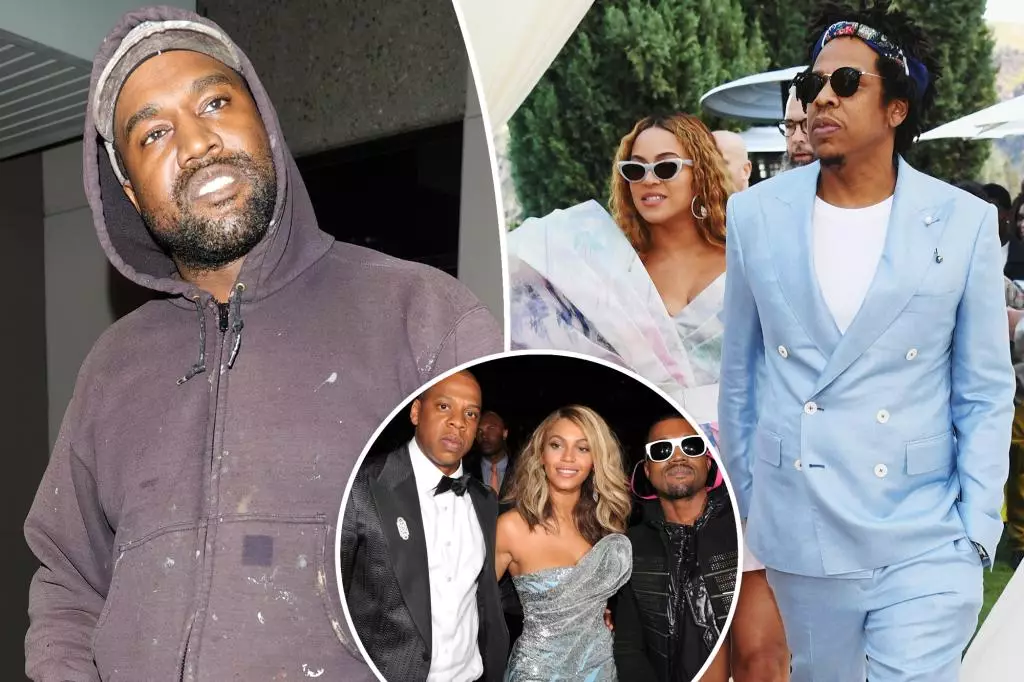Kanye West has become synonymous with public outbursts and controversial statements, but his recent tirade aimed at Beyonce and Jay-Z’s children has shifted the narrative to reveal a more fraught emotional landscape. This latest incident raises questions about West’s state of mind, his motivations, and his complicated relationships in the music industry. In his characteristic fashion, Kanye manages to encapsulate feelings of hurt and betrayal, but at what cost?
West took to Twitter to voice his grievances, expressing his pain at feeling marginalized within the very community he had long sought to be a part of. He declared his deep-seated admiration for Jay-Z and Beyonce, only to layer that adulation with a palpable sense of rejection. His tweet, “I LOVE JAY Z AND I DO FEEL BAD,” serves as both an apology and an accusation. It betrays the duality of Kanye’s persona—one plagued by insecurity and a desperate longing for familial bonds.
Revisiting Old Wounds
At the heart of his recent troubles lie incidents from almost a decade ago, particularly Jay-Z and Beyonce’s absence from his wedding to Kim Kardashian in 2014 and Jay’s decision to collaborate with Kendrick Lamar for the Super Bowl 2025 halftime show. These choices weighed heavily on Kanye, who frames them not just as simple slights but as betrayals that cut to the core of his identity. This nexus of past grievances suggests that Kanye is still nursing old wounds, highlighting a vulnerability that contradicts his often brash public persona.
Kanye’s claims that Jay-Z and Beyonce could have used their influence to provide him with “leverage” against Kardashian is an interesting perspective that speaks to the complexities of power dynamics in the realms of fame and family. There is a sense of disillusionment that permeates his words, as he laments the support he felt could have been pivotal during his toughest times. This feeling of being left to fend for himself is an emotion many can relate to, underscoring a universal need for connection and encouragement in moments of vulnerability.
The Fallout and Its Consequences
Yet, the fallout from his words transcends personal injury; it has wide-ranging ramifications for his relationships—not just with Jay-Z and Beyonce but with the broader public and industry figures. The public reaction to his comments has been predictably swift and severe. The line he crossed when attacking the mental capacity of children is particularly troubling and raises ethical questions about celebrity actions in a culturally charged environment.
This tension culminated in West’s subsequent retraction of his earlier comments, signaling a level of awareness that wasn’t always present in his past outbursts. His reasoning—that he deleted the tweet to avoid the cancellation of his Twitter account—casts a less-than-flattering light on him. While Kanye has been known for his boldness and disregard for societal norms, the self-preserving motivations behind his actions provoke skepticism about his true feelings.
A Look at the Bigger Picture
Furthermore, this incident provokes a critical assessment of fame, mental health, and the inherent fragility of interpersonal relationships in high-pressure environments. While celebrities often project an image of invincibility, they, too, are subject to the same emotional turmoil as anyone else. Kanye’s expression of feeling like “the black sheep” taps into a larger narrative about isolation and betrayal experienced by many artists, particularly those of marginalized backgrounds.
In the broader context, how do we navigate our consumption of celebrity culture? Kanye’s behavior, while problematic, illuminates the harsh realities of fame and the psychological toll it can take on individuals. Are we spectators enjoying the spectacle, or are we complicit in perpetuating harmful narratives? The duality of admiration and judgment plays out in real-time on platforms like Twitter, where thoughts can be shared as quickly as they can be regretted.
For Kanye West, the fallout from these moments will likely be just another chapter in an increasingly complex saga. As he continues to voice his grievances, he reminds us that the line between artist and persona can often blur, leaving behind a vulnerable human seeking understanding amid the chaos.

